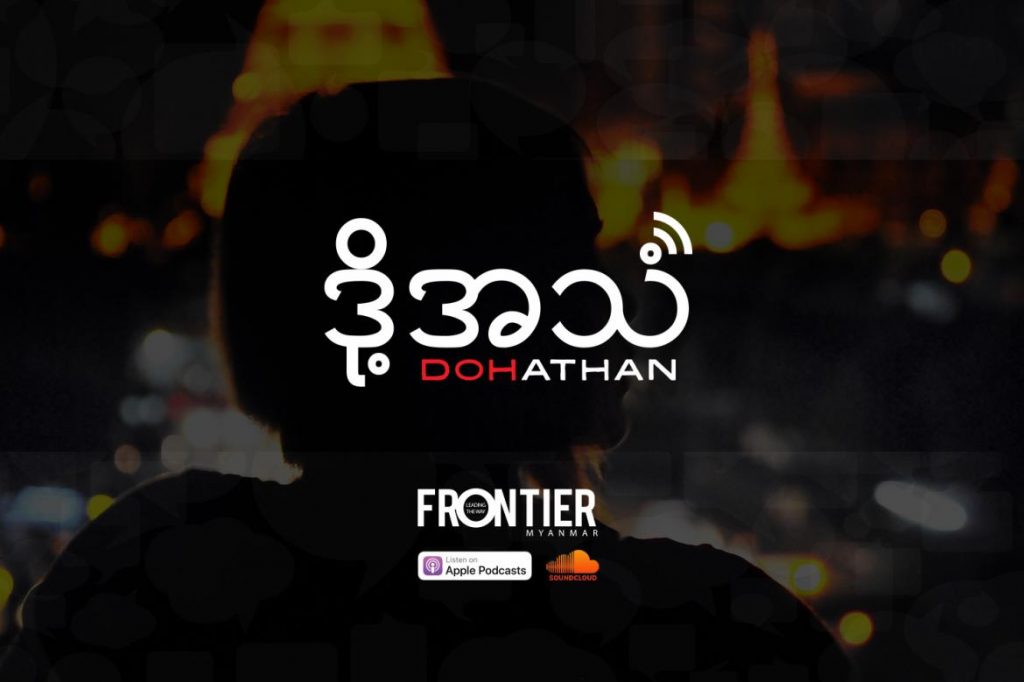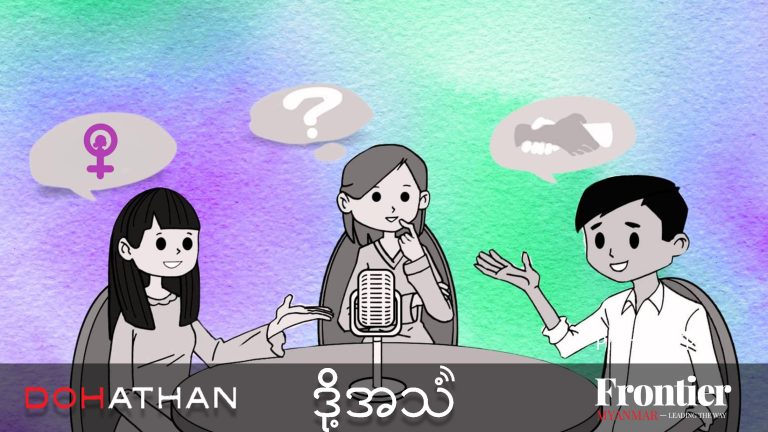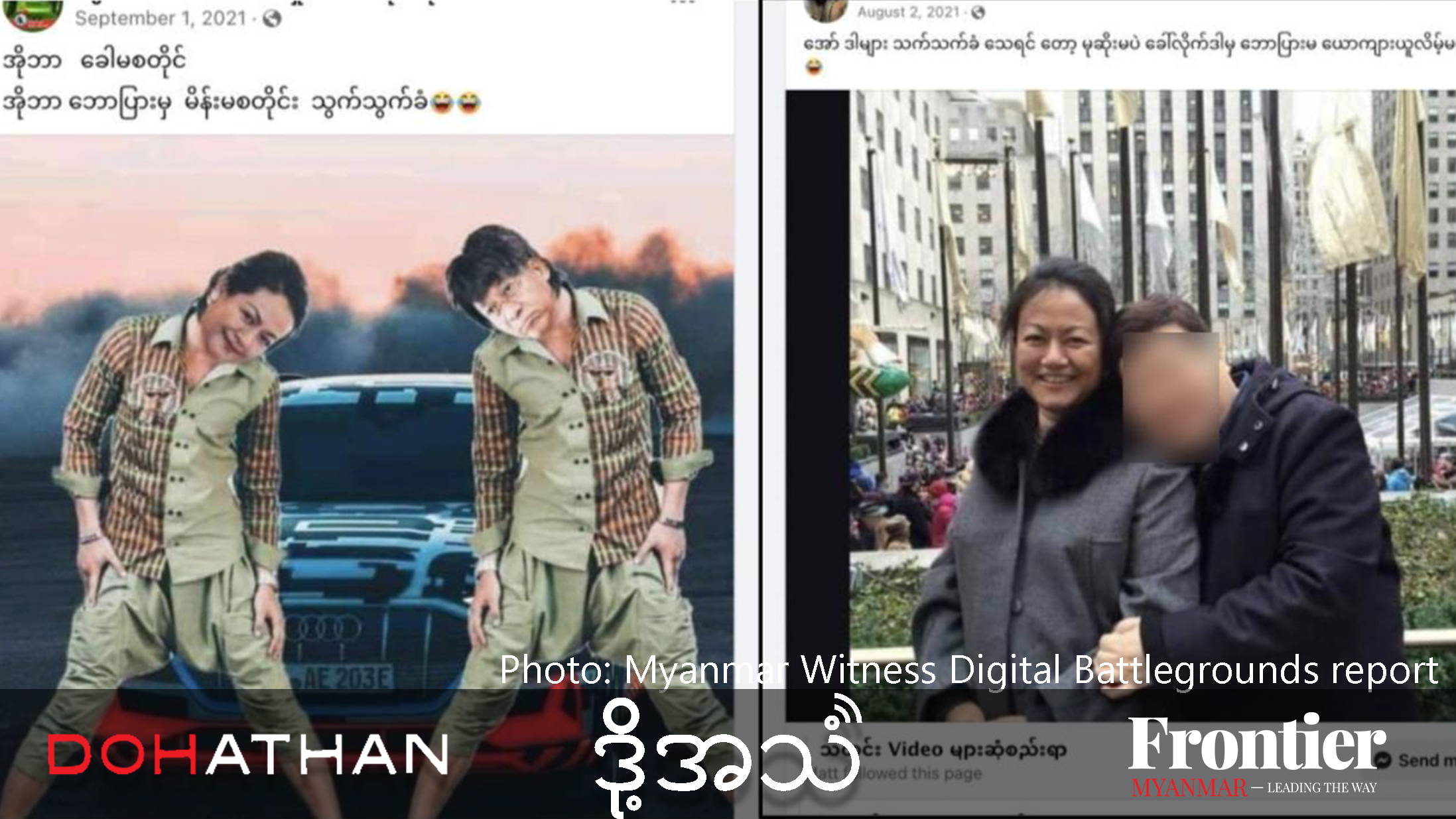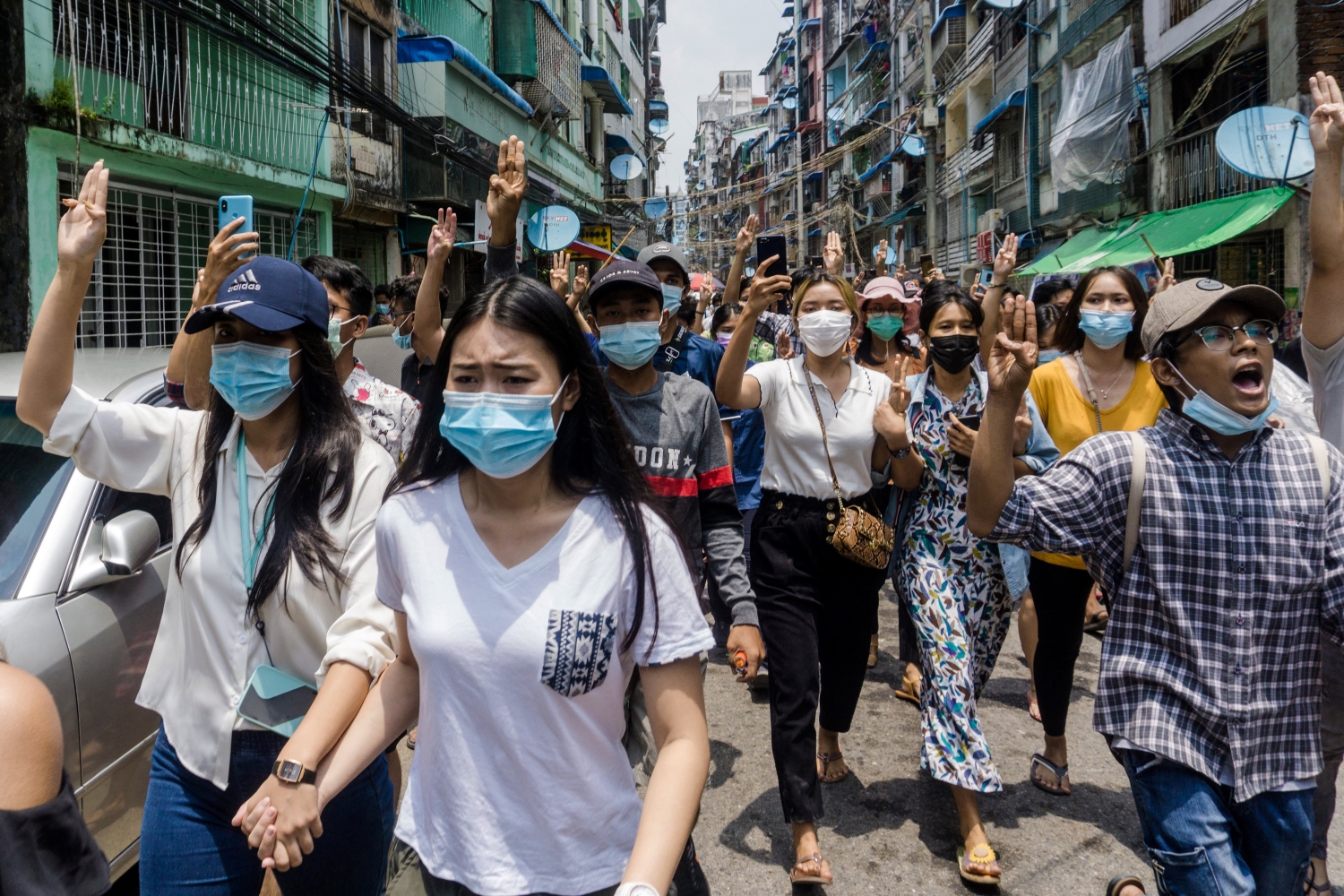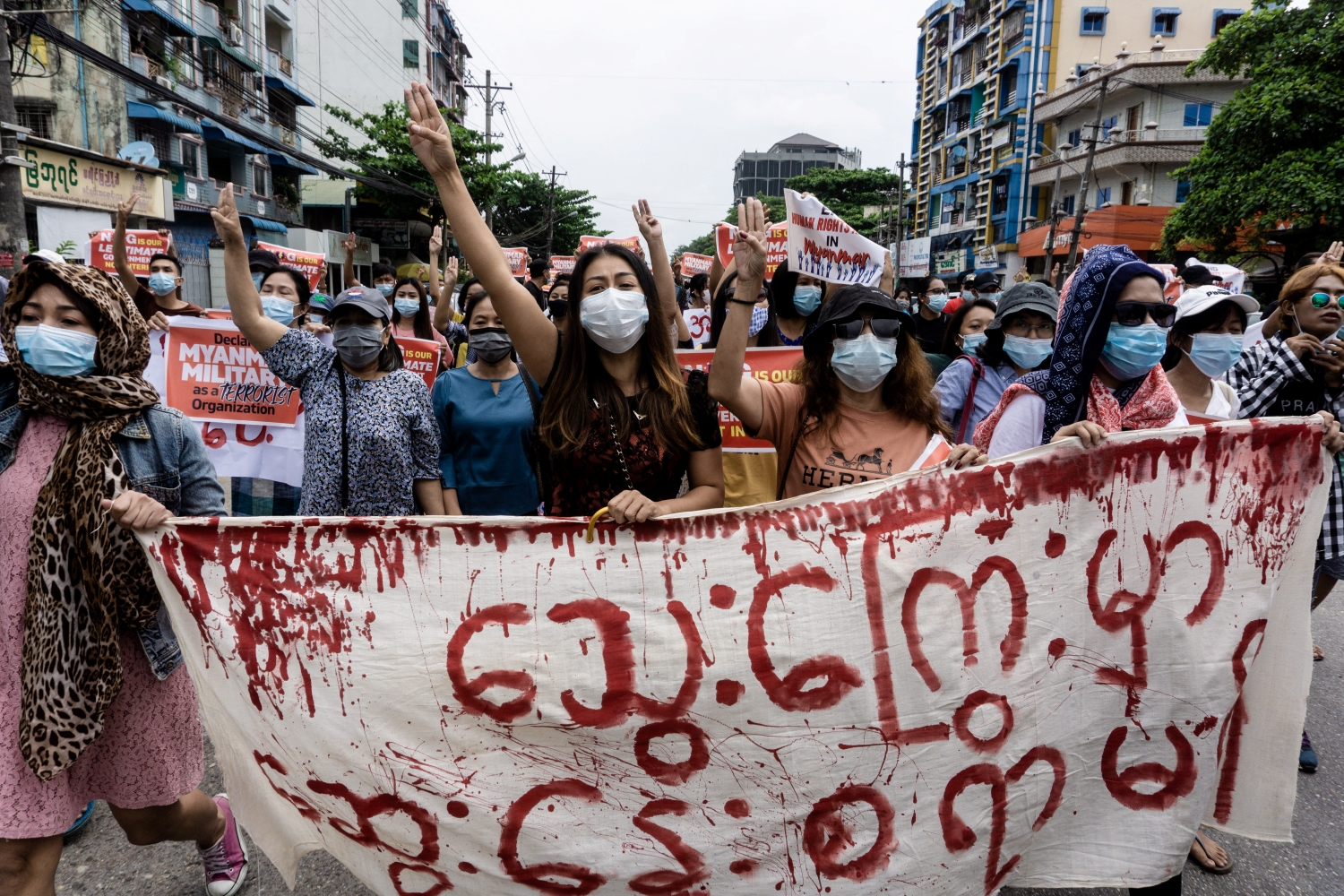In this episode we will be discussing the sexual harassment of women in Myanmar.
Although it is widely under-reported, figures show that at least one in four women have experienced some form of physical or sexual abuse.
Episode 4 script
Win Zar Ni Aung: Mingalabar, welcome to Doh Athan, the new weekly Human Rights podcast from Frontier Myanmar, I am Zar Ni.
Support more independent journalism like this. Sign up to be a Frontier member.
Our pioneering audio programme, the first of its kind in Myanmar, gives us the opportunity to shine a spotlight on and speak to many voices about human rights issues that affect people across this beautiful country.
This week we will be featuring the scourge of sexual harassment on women in Myanmar. Although it is widely under-reported, figures show that at least one in four women have experienced some form of physical or sexual abuse. As you will here, it’s not just at home – abuse occurs on the bus, in the street and at work.
Some of the names in this podcast have been changed to protect their identity.
Ma Thandar was just 13-years-old when she first suffered sexual abuse. The horrific memory won’t leave her until the day she dies.
Ma Thandar: I never forget until I die. That is the most hurt moment of my life. Since I was 13 years old, my little sister bought a doll from the hawker while I was taking a bath in front of my house. That man was looking at me and he masturbated. I didn’t know what he did but I told him to go out.
Win Zar Ni Aung: Sadly for Ma Thandar, now aged 26, it wasn’t the last time she suffered sexual abuse.
Just two months ago she was travelling on the 23 bus in Yangon when a man sexually assaulted her.
I took the YBS 23 bus when I went to training on September 9. Someone was sitting close behind me. He rubbed his penis on me. I made a signal to shout or do something to him when I noticed it. And then, he got off the bus quickly.
Win Zar Ni Aung: Factory worker Ma Thidar has twice been the victim of sexual harassment.
Ma Thidar: My husband worked night shift at the broker’s house. I brought a lunch box for dinner every evening. A person riding a bicycle, asked me the way to the Pha Yar Gyi Street. While I was telling him the directions, he touched my breast . I am so frightened and I hit him to my right hand. He ran away with the bicycle. I though if I were a boy, they wouldn’t treat me like this.
Win Zar Ni Aung: She has also suffered abuse at work and on the bus.
Ma Thidar: That day I was late to work at the garment factory. I saw a man touching himself under the street lamp. I was so frightened. I shouted, “You are a dog,” and then I fled.
Win Zar Ni Aung: Their experiences are not unique. Many women in Myanmar suffer sexual harassment on the streets or on public transport as well as at home.
In many cases community responses to violence against women are contradictory. Although some organisations support abused women, underlying community beliefs – such as pressure to remain in a relationship for the sake of children – often prevents women from taking steps to end the abuse.
In many cases, incidents of sexual abuse goes unreported because the victim thinks it will be a waste of time.
About 35 percent of the world’s women experience sexual violence from either their partners or strangers during their lives, various studies show. A study by the World Health Organization shows that about 30 percent of women in relationships report having experienced physical or sexual violence by an intimate partner.
In Myanmar, data scarcity on the issue remains a challenge. A country-wide report by the Myanmar National Committee for Women’s Affairs said that between four percent and 21 percent of women reported experiencing mental violence while between three percent and 15 percent reported physical violence. Such varying figures show that little research has been done on the issue and real numbers are likely to be much higher due to underreporting.
Daw Pa Pa, a project coordinator for Akhaya Women Myanmar, an organisation that provides support for women to challenge gender stereotypes, explains the difficulties faced by women wanting to report sexual abuse.
Daw Pa Pa: There are some difficulties to present in court without evidence. The policemen and other officials discourage presenting that kind of case in court. They wanted some witnesses for the same kind of cases. Also some do not want to complain about it in court because they believe it is a very shameful kind of case. That’s why there is no report about that kind of case.
Win Zar Ni Aung: The Legal Clinic Myanmar helps promote and strengthen the rule of law, democracy and human rights in Myanmar. It also helps women who have been the victim of sexual abuse and provides a 24 hour hotline to get legal help.
Its director, Daw Hla Hla Yee, said few women complain because they do not understand the law.
Daw Hla Hla Yee: There is no understanding how to present in court step by step and no mechanism for prompt investigation . Some of the cases will be taken directly to court. There is strong evidence needed, documents, witnesses. Victims can’t give the evidence because they are so frightened when they face that kind of situation. Most of the witnesses do not want to attend the court. It is difficult to prove. That is why there are few cases to present in court.
There is no law for women domestic violence, sexual harassment at work, but accusations can be made under the Penal Code.
Win Zar Ni Aung: According to the penal code, perpetrators of sexual harassment can be sentenced to two years in prison, a fine or both.
The Ministry of Social Welfare, Relief and Resettlement have worked with civil society organisations the the Violence Against Women Prevention Law and it will be discussed the parliament soon.
Doh Athan will further explore the issue of women’s abuse later this month.
Now we will round up some of the human rights stories currently making news in Myanmar.
Women living in conflict zones in Kachin need special protection laws to safeguard them against abuses, against violence and to ensure their welfare, health and education, Kachin-based women’s groups say.
“Everybody is suffering negative effect of war in conflict zone,” said Nbau Nang Pu, director of Htoi Gender and Development Foundation, during a forum held in Yangon on November 2. “But Women and children suffer more. Justice is lost for Women in Kachin State. Everything is not fair for women. We need special protection law for women as soon as possible.”
According to data from the Htoi Gender and Development Foundation, 140,000 people are displaced in 172 camps in Kachin. Moreover, 347 villages were destroyed due to ongoing war in Kachin since 2011. Most of the displaced are women and children.
Women’s groups in the Kachin State presented on October 30 to various commissions in the Hluttaw their assessments on the plight of the women in conflict zones in the state, in a bid to hasten the passage of a law intended to provide more protection for women.
The women activists noted that the Prevention and Protection of Violence Against Women bill has been under consideration in parliament since 2013 but there no progress in the past four years.
The Ministry of Social Welfare, Relief and Resettlement is managing the bill, which is still going through various ministries for comments.
A documentary film about young people affected by conflict in troubled Rakhine State which was banned at a recent Yangon film festival has been screened in the United States.
Sittwe is a 20-minute documentary about two teenagers — a Rohingya girl and a Buddhist boy — segregated by conflict in Rakhine.
Its makers said the film was produced to facilitate discussions about peace building in Myanmar.
Sittwe was banned from being shown at Yangon’s Human Rights Human Dignity Film Festival in June this year by the Films and Video Censorship Board, citing cultural and religious sensitivities.
It premiered at the Freedom Film Festival in Malaysia in September and was awarded the Best Southeast Asia Short Documentary.
The film was also presented at the US Mission to the United Nations in New York when UN Special Rapporteur for Human Rights in Myanmar Yanghee Lee presented her report to the UN.
We hope you enjoyed this edition of Doh Athan.
This programme was put together this week by Zar Ni and A Htet.
You can read the above-mentioned news and other interesting articles via Frontier Myanmar’s website and Facebook pages and you can share your thoughts on these pages freely.
Please stay tuned for next Wednesdays’ episode and visit the Doh Athan Facebook page.
The project to support human rights reporting is a partnership between Frontier Myanmar and Fondation Hirondelle, funded by the Embassy of the Netherlands in Myanmar.
Thanks for staying with us while broadcasting.
Have a nice day.


